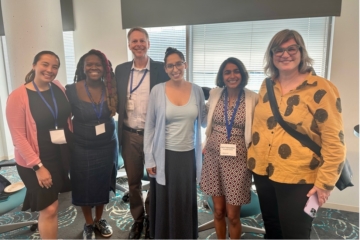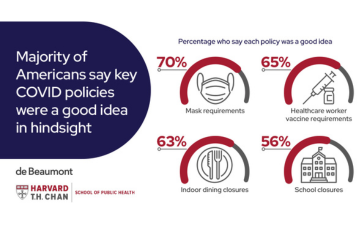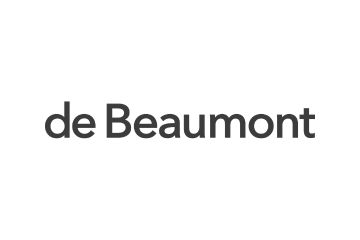The de Beaumont Foundation’s Speaker Series highlights leaders in public health practice, advocacy, policymaking, and other related fields.
At a time when public health has been stretched to the limits, it helps to have seasoned professionals guiding a path forward. John Auerbach, president and CEO of Trust for America’s Health (TFAH) is a public health pioneer whose career has spanned the local, state, and federal levels — from leading the Boston and Massachusetts health departments to directing policy at the Centers for Disease Control and Prevention. His varied work has given him insights that are especially pertinent to 2020‘s health and social crises. These are a few of the lessons he‘s learned during his extensive career in public health that can be applied to the current landscape.
Engage with communities on the ground.
Auerbach was led to public health through his involvement in the civil rights and labor movements, working on factory assembly lines and labor organizing. “It was the best training for working in public health,” he said, “because I got to work with all different kinds of people from different places and different backgrounds,“ which he said taught him “to change the way that you talk to people and you message with people based upon who they are and the conditions that they‘re facing.“
His on-the-ground experiences have influenced his views on policy as well. “I try not to think of policy on a 3,000-foot level, but to think about it in terms of what it would mean for the lives of the people that I work with,“ he said.
Build interest in the public health workforce early on.
Many young people are exposed early on to career possibilities in the healthcare field, but they rarely learn about opportunities to work in public health. This was the case for Auerbach, who wants more students to learn about career options in public health. Professionals should ask, “What makes people want to be in public health? And does it incentivize those who want to make a difference in terms of the health and well-being of the public to go into this career?“
Students need opportunities to observe and participate in public health initiatives and training programs based on real-world challenges, Auerbach said. Such hands-on experience is especially important for bringing more people of color and people from low-income backgrounds into the workforce.
Walk the talk on social justice.
As organizations come to terms with legacies of institutionalized racism and other forms of bigotry, they face increased pressure to not only call out wrongdoings, but also look inward to change their own practices. At TFAH, “We‘ve been paying a lot of attention to internally making sure that we‘re walking the talk,“ Auerbach said. “We just in the last few years have gotten to the point where the diversity of our workforce is much, much stronger than it was before.“
These considerations are top of mind for public health organizations that seek to promote equity internally and externally. “For those of us who are interested in health and well-being and justice,“ he said, “having an opportunity to work on that, think concretely about the moment we‘re in and the opportunity to make progresses has me optimistic and excited.“
Connect to core values.
2020 has forced people to adapt in ways that they could not have expected, and in some ways that are long overdue. “All organizations have had to be nimble and adaptable this year in particular, with the historic pandemic and the greater focus on racial equity and justice,“ Auerbach said. TFAH has been responding to current events by connecting them to organizational values. In the case of chronic underfunding for public health, “we adapted that so that it had particular relevance to ensuring that we learn the lessons from COVID-19 about core public health funding, and not simply relying on supplemental funding in the middle of an epidemic, but building out the public health infrastructure.“
Be intentional in multi-sector partnerships.
Although public health touts the value of multi-sector partnerships to promote community health, there is more to developing these relationships than simply bringing people of various backgrounds to the table. Partnerships need to be strategically convened to be meaningful. “When we call for these multi-sector partnerships and we don‘t have people who are multi–sector partnership builders or we only have those in very limited silos, that‘s where our hands end up getting tied in terms of the potential to do good things,“ Auerbach said.
Public health foundations have exemplified how to convene and carry out multi-sector partnerships, drawing in various actors and determining their unique strengths, he said. But they can only go so far. From there, it‘s on leaders in government to implement and scale up these partnerships through funding, training, and technical assistance.
Let public health experts lead.
States and localities are increasingly reassessing whether their public health agencies need to be led by physicians — many require health directors to have an MD — when public health expertise is more important than medical knowledge when dealing with population health. “There‘s a very bright and sensible future for people who have public health degrees or other non-clinical degrees,“ Auerbach said. “And it‘s bright for clinical leadership when they‘ve been trained with public health.“ Having been a non-clinical expert at the helm of a health department, Auerbach believes that medical training isn‘t the key to strong public health agency leadership. However, health departments thrive when people from different backgrounds work side by side on community health goals.
Push for increased public health funding — no matter what.
Even amid the chaos of overlapping crises, it‘s critical to push for public health funding, safeguarding the nation from future devastation. “This is a time for us to pay the most attention to building a sustainable core, including advocating for billions of dollars in public health infrastructure,“ Auerbach said. He added, “We should be advocating for direct governmental money when something has been proven to be necessary or when there‘s a significant gap, even if it seems like we‘re doing it in the midst of cutbacks.“
His advice: “Get some concrete and specific requests, and fight like hell for them.“





